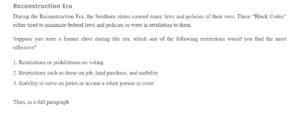Reconstruction Era
Restrictions or prohibitions on voting
Are you in need of a genuine copy of “Reconstruction Era”? Reach us at eminencepapers.com
During the Reconstruction era, black people were prohibited from voting, especially in the South, despite the Supreme Court passing the 15th Amendment granting voting rights to all Americans (Dierenfield, 2013). Due to this restriction, African Americans had limited influence on society. They were not allowed to hold elected offices, nor did they have an opinion on the taxes they were required to pay. Also, they had close to zero control over local courts, police, or public schools. In effect, they were denied several rights as citizens. The lesson learned is that voting is one of the most fundamental rights in a democracy. Without it, the government easily ignores and abuses its citizens (Dierenfield, 2013). That happened to black people living in the South after Civil War Reconstruction. Despite their voting rights being guaranteed by the federal government, the white supremacists in the state government systematically took their voting rights away.
Similar Post: When Duty to One’s Employer Conflicts With a Duty Owed to the Public
Reference
Dierenfield, B. J. (2013). The Civil Rights Movement: Revised Edition. Routledge.
ORDER A PLAGIARISM-FREE PAPER HERE
We’ll write everything from scratch
Question 
Reconstruction Era
During the Reconstruction Era, the Southern states created many laws and policies of their own. These “Black Codes” either tried to minimize federal laws and policies or were in retaliation to them.
Suppose you were a former slave during this era; which one of the following restrictions would you find the most offensive?

Reconstruction Era
- Restrictions or prohibitions on voting
- Conditions such as those on the job, land purchase, and mobility
- Inability to serve on juries or accuse a white person in court
Then, in a full paragraph
- Discuss the immediate and long-term consequences of your chosen restriction. Identify any lessons we can learn today from this restriction and its impact. Identify the source(s) where you read about the limitation.